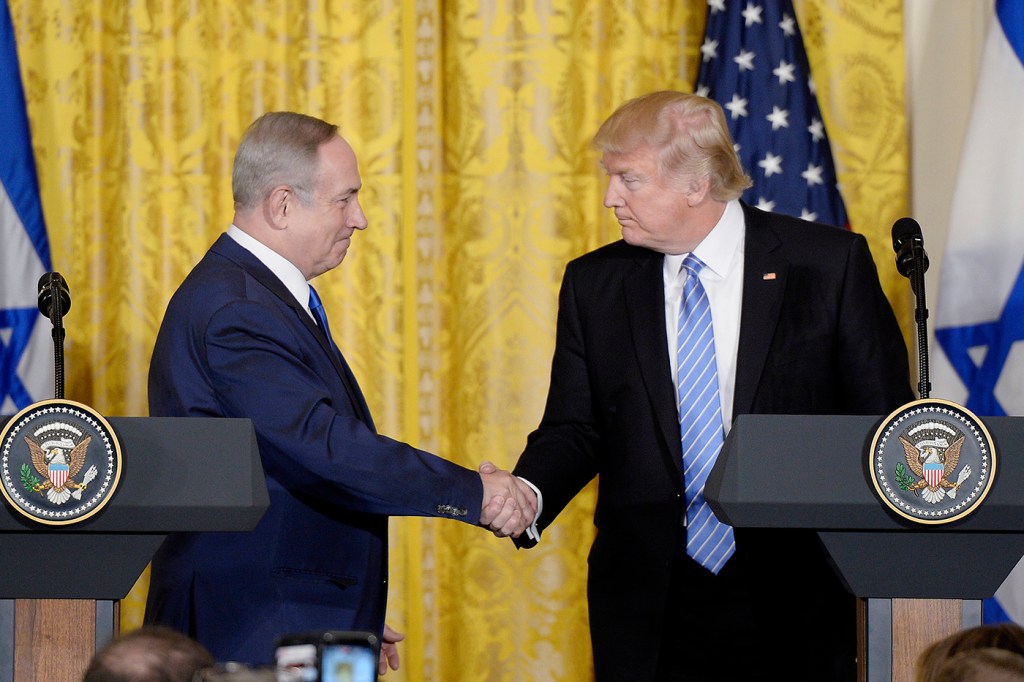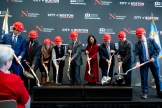In first overseas trip, Trump must show he’s ready to take on key global issues

President Donald Trump departed the White House on Friday to embark on his first foreign trip as commander in chief. The nine-day, five-stop tour will include visits to Israel, Saudi Arabia, and the Vatican, where he plans to meet with Pope Francis, as well as a NATO meeting in Belgium and the G7 Summit in Italy.
We asked professor John Portz, interim chair of the Department of Political Science, to examine the global significance of Trump’s tour of the symbolic homes of the world’s three Abrahamic faiths.
National security adviser H.R. McMaster told reporters that the purpose of Trump’s trip is three-fold: “First, to reaffirm America’s global leadership. Second, to continue building key relationships with world leaders. And, third, to broadcast a message of unity to America’s friends and to the faithful of three of the world’s greatest religions.” How do you reconcile Trump’s itinerary with his “America First” campaign rhetoric?
This is a good example of how campaigning is different from governing. The “America First” slogan was very much created for a domestic audience, in particular a voting audience. But now that Trump is president, the campaign has to change—he has to learn how to govern from a global perspective. Once he steps outside the country, the original campaign slogan must morph into something like “America First in the World”—and we know that Trump is a strong believer in being the best.
In all his meetings overseas, he needs to come across as positive and presidential. He can’t afford to have little gaffes, like not shaking someone’s hand when he’s supposed to. But, more important, he needs to share a strong message: that he’s chosen to go to the Islamic world to take on important issues facing the global community, including ISIS.
From a political perspective, what does Trump have to gain from this trip? What does he have to lose?
The opportunity for Trump—the potential gain—is to change the conversation from an embattled presidency to leader of the free world. The investigations and almost daily intrigue will continue in the U.S., but he has an opportunity to move the media off of that and to his overseas travels. He would be best served to focus on this leadership role and avoid a running commentary on Twitter on what is happening in the U.S.
The potential downside to this trip is if he comes off as not presidential, whether through failures in etiquette or more substantive policy statements. He’s new to this political role, so one would expect some mistakes along the way, but many in the domestic audience are looking for more examples where Trump lacks the character and disposition to be a president.
Just days before his trip, The Washington Post reported that Trump disclosed highly classified information in a meeting with Russian officials at the White House—information that was reportedly provided by Israel. How do you foresee this development impacting the relationship between the U.S. and the global community, including the countries Trump is visiting on his tour?
Historically speaking, presidents have viewed foreign trips as opportunities to shift the focus away from domestic problems—and there’s no doubt that the timing of this trip is good. Having said that, leaders overseas are certainly aware of what’s going on here in the U.S., and they’re probably wondering just how credible Trump is. He’s under siege in his own country, making it more challenging for him to present a positive image on foreign soil.
There is a growing recognition by others around the world that Trump doesn’t operate by the traditional mores of diplomacy—he marches to his own drummer. And the way he revealed that highly classified information to the Russian officials in their meeting was his way of showing that he doesn’t pause to think about protocols before acting. Going forward, I don’t think his disclosure will stop the flow of classified information, but it might put more responsibility on high-ranking members of the administration, from the national security adviser to the secretary of state, to make sure this doesn’t happen again.
Trump’s first stop was Saudi Arabia, home of Islam’s holiest sites, where he delivered the keynote at an Arab-Islamic-American Summit. “This is not a battle between different faiths, different sects, or different civilizations,” Trump said of the fight against terrorist groups. “This is a battle between barbaric criminals who seek to obliterate human life, and decent people of all religions who seek to protect it. This is a battle between good and evil.” Given that Trump signed an executive order banning immigrants from seven Muslim-majority nations just days into his presidency, how effective do you think his speech was at bolstering his relationship with the Islamic world?
As a candidate last year, Trump frequently equated Islam and terrorism. For many in the electorate, that worked. As a president on the world stage, he has a different task and a different audience. In his speech on Sunday, he attempted to draw a line between Islam as one of the great faiths of the world and “Islamic extremism” as a flawed ideology and the source of terrorism. That is certainly a better framing than his campaign rhetoric and might help his relationship with some in the Islamic world. It was, however, a “good” versus “evil” approach that simplified terrorism to deviance within the Islamic world without recognizing or acknowledging different sources and variations of terrorism around the world. Some Islamic leaders may take exception to this characterization that still puts their religion, albeit exercised in a fundamentally flawed way, as the source of terrorism. With respect to the executive orders, Trump can continue to say that their purpose is to keep terrorists out of the U.S. and protect the country—it wasn’t about Islam, which he respects, even though others would frame it that way.
As part of his trip, Trump will meet with both Israeli Prime Minister Benjamin Netanyahu and Palestinian Prime Minister Mahmoud Abbas. How much progress do you expect Trump to make in his quest to orchestrate the “ultimate deal” to end the Israeli-Palestinian conflict?
Creating peace between the Israelis and Palestinians has been a decades-old challenge, so I don’t have great hope that Trump would be able to solve it. What’s interesting, however, is that Trump seems to approach the Israeli-Palestinian conflict in a slightly different way than other presidents before him. In the past, he’s publically stated that Israel and Palestine should do whatever it takes to resolve their problems—whether it’s a one- or two-state solution, he’s declared his support. But I doubt this approach would be any more successful than other tactics, particularly because it puts the burden on Israel and Palestine to come to an agreement, which they haven’t been able to do in decades.
President Trump and Pope Francis do not see eye-to-eye on much, differing on everything from immigration to climate change. But the pope recently told reporters that he wants to find common ground and work for peace with the president, saying that “I never make a judgment about a person without hearing him out.” On what issues do you see Trump and Francis finding common ground?
It may be a challenge for President Trump and Pope Francis to find common ground on any particular policy issue. What’s more likely is some accord, perhaps in a public statement following their meeting, in which they point to their agreement on more general principles and broader themes. For example, they could agree on the importance of human dignity and individual liberty in shaping political and religious societies.





